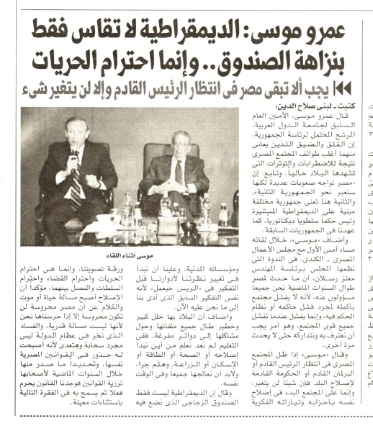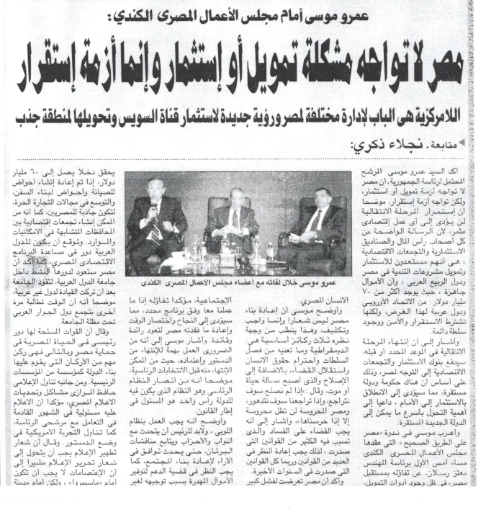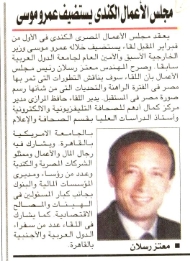
Date
Speaker(s)
Designation
Description
The Canada Egypt Business Council (CEBC) hosted a special event and panel discussion featuring H.E. Amre Moussa, former Secretary General of the League of Arab States and former minister of foreign affairs, together with distinguished presenter and media guru, Mr. Hafez Al Mirazi. The event was held to discuss the future of Egypt in light of the heated debate and political confusion that is currently dominating Egypt’s political scene. The discussion also covered Moussa’s presidential candidacy and his vision for Egypt.
The event is the seventh in a series of events addressing economic and political issues pertaining to Egypt after the revolution. Over 260 notable attendees were present at the event from ministers, ambassadors, CEBC members and guests and numerous public figures and renowned businessmen. Also present were ambassadors of Canada, Lebanon, Morocco, Turkey, Spain, Cuba and Greece.
CEBC Chairman, Mr. Motaz Raslan, in his remarks, highlighted that as the nation celebrates the first anniversary of the Egyptian January 25 revolution, it is in a difficult juncture. Concerning strong disagreements among political factions around the Supreme Council of Armed Forces (SCAF), Raslan quoted Omar Ibn El Khatab, a leading companion and adviser to prophet Muhammad (PBUH), in his famous saying that if God wants to punish a group of people, He would let them delve into unending debate, pointing out the gravity of the situation. He also expressed his concern at the deeply entrenched divisions within the different political factions and its negative impact on economy criticizing and blaming the old regime for the challenges the country is facing now. He sees that as SCAF hands over power to the elected president in June, not much will change, as change should be prompted from within the people. Raslan addressed the presidential elections race and said that it will be a tough competition although there will not be much prestige in the post as much as heavy and enormous responsibilities. He then welcomed the event’s speaker, Mr. Amre Moussa praising his prominent career, which even though was mostly under the old regime, was full of achievements and stands on issues that set him apart from his counterparts such as Moussa’s stand on the Arab – Israeli conflict and his campaign against a Nuclear Israel.
Mr. Hafez Al Mirazi, Director of the Adham Center for TV and Digital Journalism, also served as Washington Bureau Chief for Al-Jazeera, and hosted the channel’s weekly show from Washington, currently hosts the popular Egyptian show, Studio Cairo, started his word speaking of the time he spent in Washington and of his experience with the American presidential elections, which he worked very closely on. He noted that, in the U.S., it was not much the platform of a candidate that the voters assessed a candidate based on, as much as his political attitudes and achievements in past careers, and that a candidate’s previous achievements foretell his or her future performance, while a platform can be engineered to appeal to people, without guarantees that it will in fact be implemented. He also highlighted the importance of naming the presidential candidate’s vice president, calling it “a presidential candidate’s first test”.
Al Mirazi stated the great advantage of the media coverage the potential presidential candidates are currently receiving, “it is quintessential for voters to get well acquainted with the different candidates”.
In relation to the question of “the Constitution or the president first”, Al Mirazi sees that it is absurd to believe in the possibility of re-writing a constitution within a few months. He referred to the American experience, where controversy was the key player in the process, in which much time was invested, in order to reach a consensus between the different factions of society. In conclusion to this, “making mistakes is a mandatory part of the process and that the entire nation should not suffer a destructive pause until the drafting of a constitution” Al Mirazi noted.
Mr. Amre Moussa, then assumed the floor starting his speech by going back to a statement he made in 2010, which Raslan referred to in his opening remarks, mentioning that Moussa had predicted that the Arab world will witness immense changes and his prophecy came true. He expressed his confidence that if this same crowd would meet in a year from now, another prophecy would again be true and Egypt would be by then on the right track towards progress. Explaining his point further, he resembled the current situation of the country to ingredients boiling to soon produce tasty healthy food, expressing his faith in Egypt emerging into its ‘second republic’, to become one that is radically different from the first dictatorship one.
Moussa sees that Egypt in the shadow of the past regime was locked in a stalemate, and that now it is time to focus on progress “when a state fails, it is not merely its institutions that fail, but also the people” he noted, adding that when one looks forward to progress, one should not seek it in a new parliament or president, but also in genuine change in the society in its more general sense, “the president is no longer the sole person responsible for the advancement of a nation, individual members of the society should have a vision for the country as the future of Egypt lies in the hands of the people of Egypt,” Moussa said.
In consensus with Raslan’s point on the negative impact the constant division and debate is leaving on Egypt, Moussa commented that it is best to abide by the plan which was laid earlier and that stipulates the complete handing over of power to civilian authority by the end of June of this year. He also said that calls to hand over power to the parliament or to an interim president were not realistic and will only result in prolonging the transitional period and that if this happens, it would in turn halt any economic progress. “The world is ready to fund massive developmental projects in Egypt and other Arab Spring nations, where democracies are emerging and where peoples were able to rid themselves of deeply rooted dictatorships, the funds are ready, but they will not start flowing until there is a long-standing legitimate authority in place,” Moussa added.
Moussa then highlighted the importance of planning for the period that will follow the handing over of power to a civilian authority, seeing that despite having numerous fields of development that are in urgent need for serious action, many would find education to be the most pressing issue of all. Another issue that should receive the same attention as education is “the Egyptian character”, from Moussa’s point of view, “values such as perseverance and hard work have been shaken in the Egyptian character, and this is the real problem that Egypt is facing, we cannot build this country, unless there is an infrastructure of values and principles. People have to believe in hard work and in their country”.
“Rebuilding Egypt is not a slogan, it is a responsibility and an agenda” Moussa said, emphasizing that rebuilding Egypt is based on three pillars, democracy, which he defined to be not merely the majority voting for president or parliament assuming power, but also the separation of powers, independence of the judiciary, respecting human rights, basic freedoms, as well as implementing and enforcing the provisions of the law. The second pillar is reform, which is at the moment a matter of life or death and that if Egypt is not progressing, it would definitely be deteriorating. The third pillar in rebuilding Egypt is eliminating corruption which is currently rooted in rules and regulations, especially those that were legislated in the last few years, tailored to serve certain individual’s interests. He added that in legal reform, the constitution, which is the father of all laws, should be the first to undergo such reforms. In disagreement to Al Mirazi’s views on the subject, he sees that drafting a constitution should not take up a long period of time. He affirmed his confidence that it is not as difficult as some believe for a group of seasoned intellectuals from the different factions of society to reach consensus about a constitution.
Moussa then addressed several challenges that would face the process of drafting the constitution. The first he mentioned was concerning the role of the president and the type of government where he favors the presidential system in Egypt adding that it is not a dictatorship, but rather puts the responsibility and accountability where it should be. The second is concerning the identity of the nation. The third and final point is in relation to the Armed Forces, where he sees that it will require some concessions on the part of the different parties involved, but will not prove too difficult to resolve for those assigned with writing the constitution. Thus, Moussa sees that it would be in the greater benefit of Egypt to start drafting the constitution now, so that by the end of the presidential race, it would be ready.
The potential presidential candidate then spoke briefly about his vision for education and health. On education, he sees that Egyptian education today does not produce a labor force that fits the Egyptian job market, nor the international one. He added that the government should not be spending millions of pounds on educational institutions, which are not producing a demanded product. On health, he mentioned a policy that was previously instated but not implemented, which stipulated the presence of health care centers in all counties, he also highlighted other challenges concerning weak management, corruption, poor choice of polices, and lack of timeliness. Moussa also mentioned administrative decentralization and developing different governorates as two processes he intends to carry out, if he becomes the president. Moussa concluded his word by expressing his confidence in Egypt’s ability to regain its former glory.
The floor was then opened for questions which discussed and highlighted important issues such as subsidies, which comprise around 135 billion Egyptian pounds and are largely funded by Egypt’s debts, another was Moussa’s stand on the Muslim Brotherhood and the possible disputes that are likely to erupt also the issue of imported food and the dramatic increase in the population that builds up each year, Moussa commented about that saying “poverty is not Egypt’s destiny, but it is the result of bad management and because citizens are not working hard enough, we are the reason behind the poverty but can still fight it”. Other questions addressed the role of the Arab League, transparency, the performance of SCAF during the transitional period.
This year Egypt will see its first elected president and presidential candidates similar to Amre Moussa make that, even more than it already is, something that the world looks forward to. Despite the many turbulences and unfortunate events that are dominating the news and the political scene, they are indeed ingredients cooking in a pot and would eventually take Egypt to the democracy its people demanded and died for in their January 25 revolution that inspired millions around the world.


























